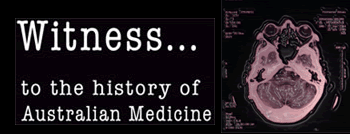


A chapter in the evolution of paediatrics in Australia
Introduction
Participants
Origins of the Department
Early developments
Leadership
New directions in patient care, research and teaching
Ethical issues in research and treatment
Formalising the research effort
Training Programs
Surgical research and training
Finding funds for research
Establishing sub-specialty departments
More on medical education
Academic outreach
Endnotes
Index
Search
Help
Contact us

Ruth Bishop: As someone who lived through this, I guess there were two camps. It was very clear to some of us that it wasn't just that people wanted to appoint Don [Cheek as Director of the Research Foundation], but they didnít want to appoint David. And it was a blocking manoeuvre. And that caused endless trouble in the Research Foundation. It got people in the wrong places at the wrong time in their careers. A lot of unfortunate things flowed from that. They finally got it right, but it took a long while. And it cost a lot of money and a lot of pain to a lot of people.
John Rogers: I was working in Baltimore with Victor McKusick[87] at the time who was one of Don Cheek's referees for the job in Melbourne. I was driving him home one night and Victor said to me did I know that Don Cheek had come back to Baltimore and was looking for another job somewhere in the States. I said, "Will anyone give him one", and he said, "Not if theyíre in their right mind". Clearly by the time I got to Johns Hopkins he was well in decline. And I think that thereís a history of that in medicine over the years.
Ann Westmore: So the appointment was made at a Board of Management level? Who made those sorts of decisions?
Peter Phelan: There was a Research Foundation selection committee and Alan Williams and L.E.G. Sloane[88] were the two who pushed for Don. He was at the Children's for nine years from 1973 to 1982 and he gradually fell further and further apart, it was a tragedy for everyone, particularly for Don - he was so unhappy.
Max Robinson: Peter, was he Director [of the Research Foundation] for nine years? That doesn't ring a bell?
Ruth Bishop: He retreated from a role in the Research Foundation, didn't he?
Peter Phelan: I was appointed Director of Thoracic Medicine in 1974 and that was as a result of the changes brought about by Don. I can remember David coming into my office to tell me that Don had been appointed. It was just unbelievable. Meanwhile David was teaching at the University as Reader in Genetics and running the Hospital's Genetic Research Unit.
Ann Westmore: How did he [David Danks] respond, June, to the prospect of becoming [Stevenson] Professor.
June McMullin (Danks): He said he wouldn't take the position unless he was asked to do so. He didnít feel he had had the support [in the past], and he wanted to be sure of that.
Peter Phelan: I remember David told me when we were at a meeting in Buenos Aires. I remember having breakfast together and he said that as he was about to leave Melbourne [to attend the meeting] he had received a call from the Dean of Medicine, Lance Townsend, asking him to take the position.
The biggest change from what I saw once he was appointed Professor was the building up of research more broadly in the Hospital through David's role as Co-ordinator of Research. I saw that as the big change.
Henry Ekert: To me the biggest change was that Don was marginalized totally and he left.
David McCredie: I think that one of the big changes was that under the Vernon Collins regime, Vernon was a godlike figure and we were all the young ones. Under David it was much more egalitarian. Don't regard me as the head, weíre all equal, was the way he looked at it.
Ann Westmore: Do you remember a meeting where that sort of thing was said?
David McCredie: Yes. And in fact, I remember saying to him on one occasion, "You're the boss David" and he said, "No, I donít want you to think like that." So it was a very different style of leadership. Vernon was a benevolent dictator, I suppose you could say. We all admired and respected him, but he was definitely up there, and we were here. It was a big change when David came. Although he was technically the boss, it was a much more egalitarian relationship.
 |
Witness to the History of Australian Medicine |  |
© The University of Melbourne 2005-16
Published by eScholarship Research Centre, using the Web Academic Resource Publisher
http://witness.esrc.unimelb.edu.au/021.html